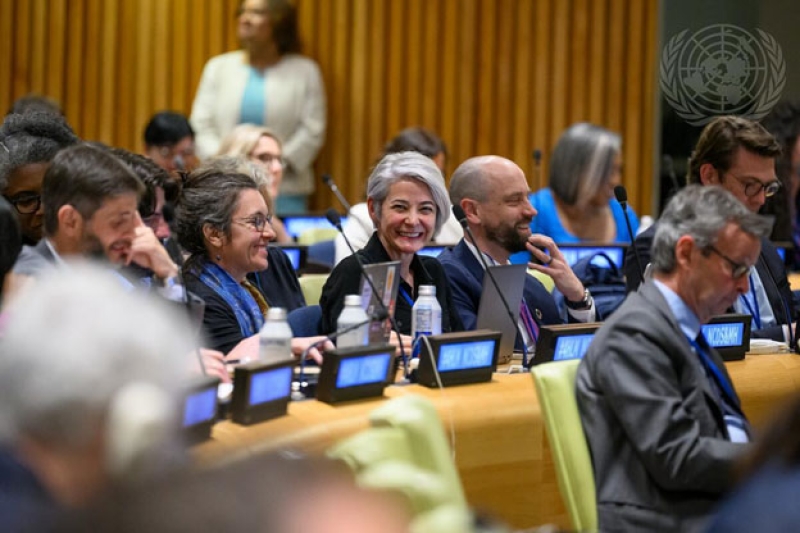- UN Calls for Calm in Bangladesh After Protest Leader’s Killing |
- DMP issues 7 traffic directives for Osman Hadi’s Janaza |
- Vested quarter fuelling chaos to impose new fascism: Fakhrul |
- Hadi’s namaz-e-janaza at 2:30pm Saturday |
- Jashore’s Gadkhali blooms with hope; flowers may fetch Tk4 bn |
Global Mental Health Crisis Grows Amid $200B Shortfall

Participants attend a UN hearing on non-communicable diseases and mental health in New York.
Although access to mental health and psychosocial support services is considered a fundamental human right by the United Nations (UN), hundreds of millions of people still face limited or inadequate access to such services.
On June 6, the United Nations Children’s Fund (UNICEF) and the World Health Organization (WHO) published a joint summary report on the well-being and development of children and adolescents around the world. In the report, both organizations underscored the risks of neglecting mental health and called for systemic change in access to critical care.
According to UNICEF and WHO, global government expenditure on mental health services accounts for only 2 percent of the total health budget, with only a fraction allocated to children and adolescents. This is particularly alarming, as UN Women estimates that nearly 20 percent of global health emergencies stem from mental and psychological conditions.
“The right to the enjoyment of the highest attainable standard of physical and mental health will only be realized if investment in mental health is increased and improved. It is important to understand what the current financial situation is across the world, and this report shows that it is not good,” said James Sale, Director of Policy, Advocacy and Finance at United for Global Mental Health (UnitedGMH).
“With the growing interest in improving mental health, now is the time to redouble our efforts in encouraging governments and donors to provide the money that is desperately needed by so many.”
WHO states that in some countries, up to 90 percent of individuals with severe mental health challenges receive no care at all. Additionally, many mental health systems globally rely on “outdated institutional models,” which fall short of modern international human rights standards. UnitedGMH also notes a USD 200 billion annual funding gap for mental health and psychosocial services, with most nations falling far below even minimal benchmarks.
This leaves children around the world vulnerable to suicide, reduced quality of life, and stunted social and professional development. To ensure equal opportunities for all youth, governments and relevant stakeholders — including the private sector — must collaborate to increase funding for mental health and psychosocial support services.
“There are two key stages in childhood for reaching one’s full potential: the early years of life and, later, starting around age 10. This age represents a second opportunity to stimulate development and build adolescents’ coping mechanisms. It is essential that they are supported in making their own decisions, participating in community life, and not remaining passive,” said Angela Capcelea, Head of the Health Section at UNICEF.
Funding is especially scarce in low-income countries, where it’s estimated that there is fewer than one mental health professional for every one million young people. The psychosocial needs of youth in developing nations are compounded by high rates of violence, conflict, natural disasters, social stigma, and lack of basic services.
According to UN Women, almost everyone living through a protracted humanitarian crisis experiences significant psychological distress. One in five of these individuals is expected to develop long-term mental health conditions such as depression, anxiety, PTSD, schizophrenia, or bipolar disorder.
UN Women reports that due to relentless bombardment, displacement, and a lack of basic services in Gaza, the mental health of young women and girls is at a “breaking point.” Approximately 75 percent of women in Gaza experience depression, 62 percent experience insomnia, and 65 percent report nightmares and anxiety.
In Afghanistan, about 68 percent of women describe their mental health as “bad” or “very bad,” and 8 percent say they personally know someone who has attempted suicide. Widespread restrictions on women’s autonomy, along with stigma surrounding mental health, leave most Afghan women and girls without access to psychosocial resources.
Further compounding the crisis, cuts to the United States Agency for International Development (USAID) have drastically reduced global funding for mental health and psychosocial support programs. Many organizations have scaled back or ceased operations. According to the Global Mental Health Action Network, 131 global programs — comprising 9,343 staff — were previously providing mental healthcare. About 73 percent of those positions have now been cut.
More than 50,000 people across 32 countries who were training to become mental health professionals lost access to their education. In 2025, only 5,908 people are projected to receive such training — a sharp drop from 55,911 in 2024. WHO estimates that by 2030, the global mental health workforce will shrink to about 10 million, with low- and middle-income countries facing a shortage of approximately 1.18 million professionals.
“My program works with unaccompanied minors. Due to budget cuts, over 60% of staff have been furloughed or are in the process of being laid off,” said Lucy Onen Adoch, Partnerships Program Coordinator at StrongMinds in Uganda, a nonprofit providing mental health support for depression.
“The government halted access to funds that directly impact mental health services for unaccompanied minors and their families, as well as access to case management and community resources such as education and legal services.”

